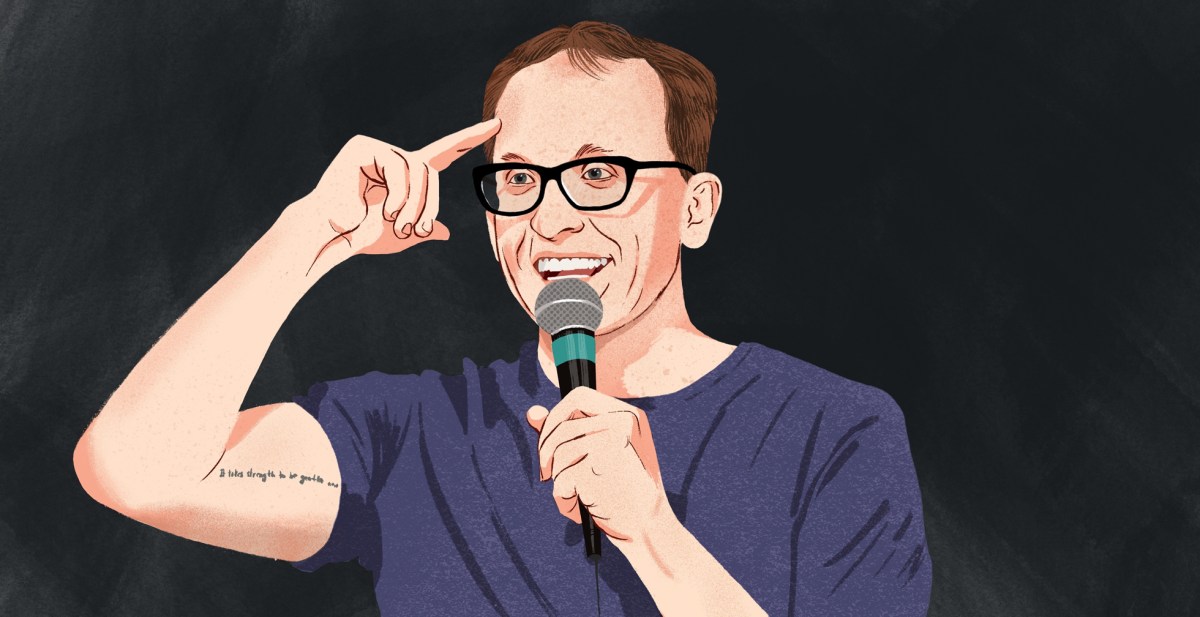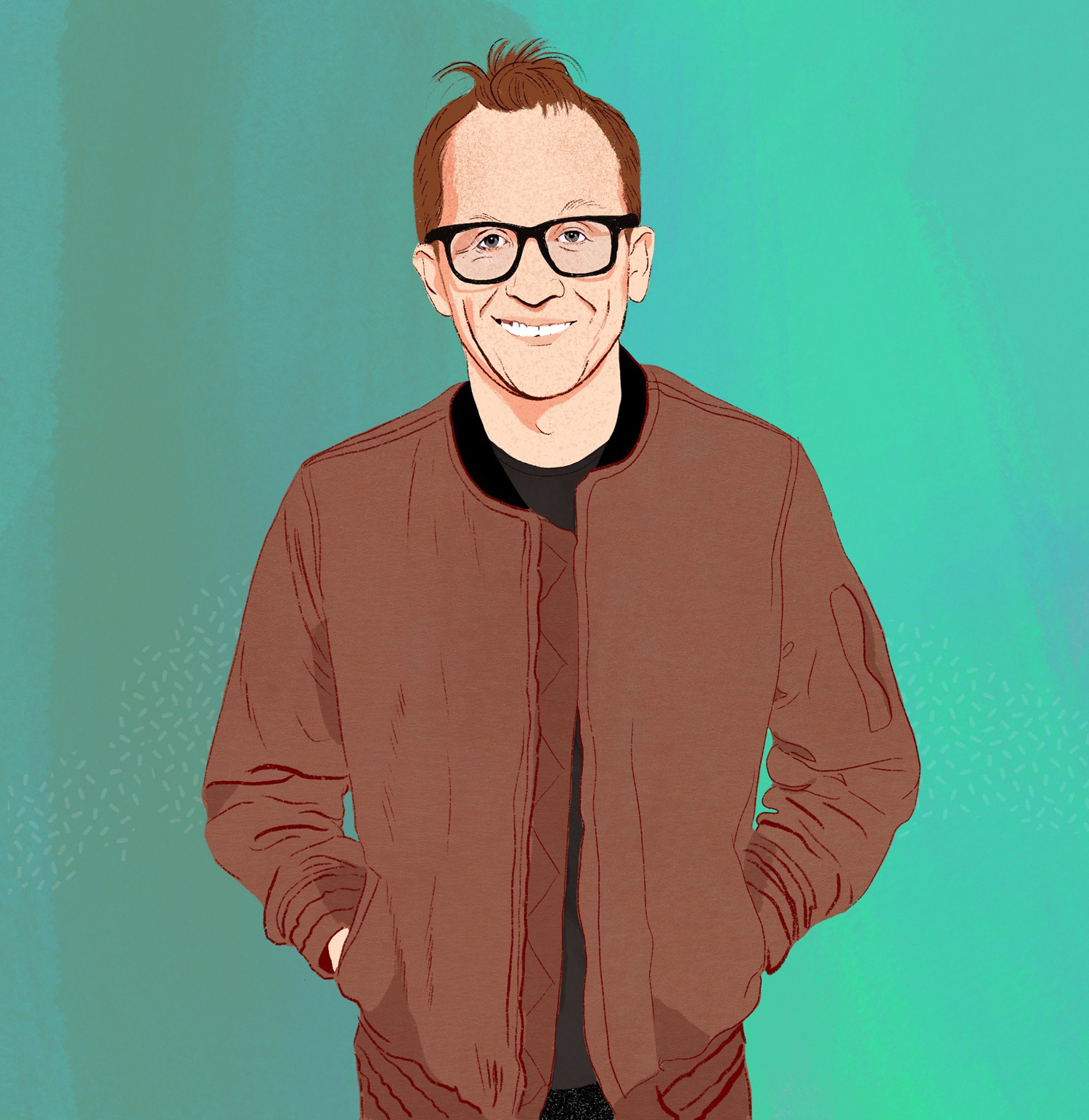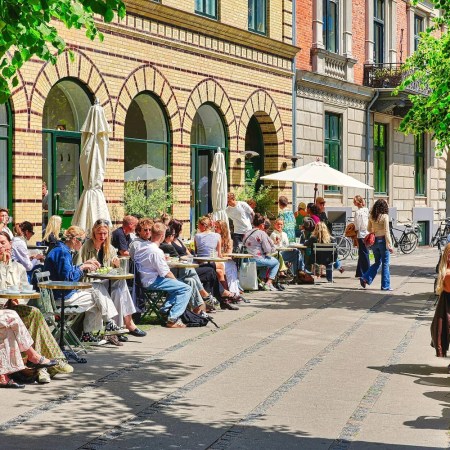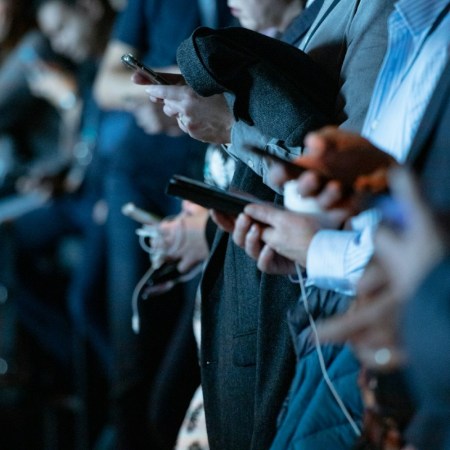
Comedian Chris Gethard Is the Unexpected Mental Health Champion We Need Right Now
His podcast Beautiful/Anonymous illustrates how “everyone’s got something going on,” and that’s comforting
Illustrations by Jessica Bromer
As a society, we’re in the midst of a redefinition of what it means to be “smart.” The dehumanizing effects of relentless algorithmic optimization and data-driven thinking have brought into sharp relief the value of emotional intelligence (commonly referred to as “EQ”) as a key leadership skill and a springboard to not only individual success, but collective success as well.
With an eye toward this welcome sea change, we’ve partnered with our friends at Lexus on a series of interviews with inspiring individuals who are forging new paths and leading their respective industries with empathy and EQ at the forefront of their work.
Today’s subject: comedian/actor/podcaster Chris Gethard, an industry veteran whose position of openness and honesty toward some of life’s more uncomfortable issues has proven both wildly entertaining and incredibly poignant in its illumination of the human condition.
Gethard’s celebrated HBO special Career Suicide addressed his lifelong struggles with mental health and addiction in a way that is incredibly sincere and refreshing (seriously, go watch it), and his podcast Beautiful Stories From Anonymous People (typically shortened to Beautiful/Anonymous and recently selected to be archived in the Library of Congress) features him taking hourlong calls from total strangers to hear, well, whatever life story they feel compelled to tell. These stories range from shocking to tragic to downright hilarious (and are often a captivating combination thereof), with Gethard lending a sympathetic ear and helping to move the conversation along in the way only a seasoned comedic talent can.
We chatted with him about his experience creating the show, the power of listening, being open about your demons, and, of course, pirates.
InsideHook: So much of your work, from improv to standup to acting to the podcast, centers around connecting with other people — whether it’s a fellow performer, an audience or a caller. Is there some sort of through-line there?
Chris Gethard: I wouldn’t say there’s a through-line in me being strategic. I look back on it and I think really what it comes down to is, I kind of dove into comedy when I was 20 years old, started traveling from New Jersey up to New York City to go for it. And I think sort of the emo answer is, I just felt like a very lonely person, and I had for a bunch of years. And I found that, when you make things and people connect with them, it kind of gives this spark where you just feel a little less lonely. You feel like someone gets you. If you can say a thing that someone laughs at as a comedian, that means they understood what you said. If you can say something as an actor, or on my podcast, that gets an emotional reaction, it’s like, “Okay, we understand each other.”
I think in my early years, it was a little bit more about me feeling less lonely, and figuring that out. I think as I became a more stable human being, I realized that I could flip that and make the whole thrust of my work about trying to give other people that feeling. And I think a lot of my work has maybe attracted people who would identify as outliers, or outcasts, or people who are depressed. I think a lot of it is saying, “If I can build something that makes those people feel a little less alone, I think that’s a pretty good resume to build.”
Have there been elements of performing that have translated to the pod?
I think I was doing improv at about the highest level you could do it, and that was for well over a decade of my life. I just happened to be in a scene that sort of raised the bar, and I was right in the thick of it. Those skills, when they’re put to use in their purest form, I think are really protective of other people.
In improv, you’re taught over and over again, “If you want to do this right, you’ve got to be protecting the other person’s idea, you’ve got to be figuring out how to suss out what they’re trying to give you and turn it into something bigger and send it back their way.” Those skills really come in handy with Beautiful/Anonymous, because if you think about that, I trained in an acting style that’s all about, “Protect the other person on stage and make the other person feel safe.” So sometimes on the phone I’m like, “Oh, they don’t even realize that we’re doing an improv scene and I’m just trying to help them out with all those skills that I learned.” So those are probably the secret weapons.
Some of it’s just that I think I’ve learned how to handle the rhythm of the call and I’m just really empathetic to hearing when other human beings are feeling a little bit of doubt, or a little bit like they have some raw nerves exposed to the world. I think I’m pretty good at reminding people I’ve been there, and also making them feel like, “If I drop the ball and this gets boring, this guy will make the jokes. If something’s coming up that’s really blowing everybody’s mind, he knows how to get out of the way.”
This is a very long, roundabout way of saying that I think one of the things that makes people feel protected is that I never put any pressure on them to be entertaining. It’s like, “You just start talking. I got your back. We’ll figure out how it’s consumable in podcast form, but it’s not your job to be entertaining. It’s just your job to talk, and it’s my job to make everything else safe for you.”
You’ve been obviously very forthright about spending a significant portion of your life in therapy, and now with this podcast you’re getting to sort of play the role of the therapist to a certain extent. Would you say that’s accurate?
My therapist actually stepped in when Beautiful/Anonymous started. Because she was listening to the earliest episodes, and the whole nature of the show is that we don’t know who’s going to be on the phone line. I have no prep, there’s no producer, they’re not doing pre-interviews or screening all that much. So it was really a lot of people looking for advice. My therapist actually stepped in pretty quickly and was like, “I’ve been listening to this new thing you’re doing. You are not trained to give mental health advice, and you’re not trained to do this. There’s a reason people go to school.”
So what I actually learned is, I draw some lines for myself where I am very happy to make people comfortable sharing their story, especially if it’s stuff that they’ve had trouble opening up about with other people. The idea that I can be someone they’re comfortable with is hugely flattering and amazing, but I do draw a couple lines and make sure people remember that at the end of the day, I am just a guy who lives in New Jersey. In some ways I think that maybe makes me feel a little more accessible in a certain sense. People know I’m just another guy rolling with the punches. I’m not looking to diagnose you, I’m not looking to analyze you, I’m just very happy to hear your story and very happy to make you feel heard.

I feel like there’s a sense that I’ve gotten from listening to the show, of the catharsis that can come with just an empathetic ear.
I’m very excited that the show has gone well, and the community surrounding it, I’m always so blown away at how passionate they are. But it also kind of bums me out, because people say things like, “This idea of lending an empathetic ear is giving people so much.” Then some people say, “What an innovative format.” That’s when it bums me out, because I’m going, “The whole thing is I sit and talk to somebody for an hour.” That’s not innovative, and it kind of makes me feel like it’s maybe some evidence of ways in which we’ve slipped as people.
I don’t want to be dramatic saying that, but if the idea of, “You’ll talk and I’m willing to just listen for an hour, and just kind of react naturally and take a deep breath, and listen more than I talk,” that shouldn’t be viewed as innovative. I’m glad it feels cool, and I’m glad people get stuff out of it and I think I am good at it at this point, but it shouldn’t feel innovative. I’m going, “Two human beings talking to each other honestly for an hour feels unusual, feels innovative?” That’s concerning.
Sponsor Spotlight
How Do You Design a Truly Empathetic Driving Experience?
Just as visionary leaders understand the importance of emotional intelligence in forging new paths, Lexus understands its importance in the world of automotive design. As they’re fond of saying, “When you design around pure technology, the result is a leading-edge automobile. When you also design around humanity, the result is a Lexus.”
This focus on emotional understanding and human-centered craftsmanship is abundantly evident in the brand’s new flagship LS, a new standard in luxury autos that seeks to create a deeper connection between driver and car to deliver a truly empathetic driving experience.
The brand’s dedicated Takumi master craftsmen (of which there are only 19 in the world) have leveraged their unparalleled skill to make each element of the LS a truly human experience. Interiors offer beauty beyond function, with Kiriko cut-glass panels and hand-pleated trims inspired by the art of origami. Connected technology including a new touchscreen multimedia display and Alexa connectivity, is focused on maximizing productivity while minimizing distraction. And features like Climate Concierge and multifunction massage seats are engineered for new levels of physical comfort.
Which is to say nothing of the LS’s top-shelf drive performance, with reduced vibration and adaptive variable air suspension for the definition of a smooth ride.
The result: when you get behind the wheel, you’re not just getting from A to B — you’re experiencing thousands of hours of labor dedicated to making you feel understood.
You say you feel like you’ve “gotten good at it.” Do you feel as though your emotional intelligence has evolved in a way that you can describe or quantify over the life of the show?
I definitely feel like there’s things that have developed in my personality and my approach to other people that the show has really given me, in a way that’s been so eye-opening, and that I’m so grateful for. I think one of the first things I learned doing the show was that listening is undervalued, and talking is overvalued, in my opinion.
So with Beautiful/Anonymous, I learned early, “I’m trying to make jokes, and it’s getting in the way of the show.” The episodes that aren’t working in the early days are the ones where I’m taking too much focus. If this show’s really about me talking to somebody else, me wanting to make a joke and get a laugh is all about my own ego. And if I really want this show to be in the service of another person, I’ve got to get back to what it was like when you actually would sit on the phone with someone else for an hour. Doesn’t really happen that much anymore. So it definitely taught me the value of listening, which I think absolutely increases one’s emotional intelligence.
Then the other thing that I feel so grateful for is, if I’m standing in line at the grocery store and the person in front of me is taking too long, or drops something and can’t find their credit card, whatever it is, I used to be someone who got very frustrated very quickly. Because of Beautiful/Anonymous, I really have grown in a way where I go, “This person might be having a really bad day, or a really bad month. Or they might do something in their real life that’s so exhausting, or so intense, or so high-pressure.” Point being, I now assume that everybody has a story, and it’s a great reminder that everybody’s living a real life. Everybody else is trying to get where they’re going too. It’s really helped me lock in better with the world, because it has taught me in many different ways how to first step outside of myself and consider other people’s experience first.
That reminds me of something a friend used to say, which was “Every person has their own internal monologue going on that you are not privy to.”
Exactly. When I make it about me and what I need in life, it’s another example of assuming I’m the star of a story walking the hero’s journey. I think a lot of us think about our lives that way. “I’m the main character in this story.” I’ve learned more and more as I get older … I mean, anybody who does standup comedy likes having a light pointed at them and being the only person with an amplification device in their hand. You like being the star of the show. But I feel very lucky that I’ve taken some turns that remind me, life isn’t about being the protagonist in some story. It’s about something a little deeper than that and maybe simpler than that. And as I’ve learned that more and more, I’ve learned how to respect other people more, cut people more slack, assume that there’s layers to them and let my guard down.
You seem to be really good at gaining trust from the callers very quickly. Do you feel like operating from that place with your guard down helps in that regard?
At this point, one of the obvious aspects is that people have listened to the show before, so a lot of times when they’re choosing to call, they’ve already decided they trust me. Which is a nice thing. But I do think that is built on the early episodes. And I think people can just hear that I’ve been very … my life became a lot more empowered when I just owned the fact that I’ve got a lot of scars and that I’m damaged goods. A lot of things really unlocked for me then, personally and professionally.
When I came up in comedy, I was in a scene where a lot of people became successful, and I love seeing my friends achieve things. But when you look at me, it’s like, “You’re a guy who did a special on HBO all about suicide attempts and different side effects of medication.” So I think I’m willing to be raw and honest, and I think people can also tell that I’m not doing that to be sensationalistic. I’m not doing that to try to carve out some image where I’m this depressed, moody, edgy guy. I’m just willing to talk about all that stuff that went wrong.
An openness about uncomfortable truths seems to be a recurring theme in your work, whether they’re coming from you in a stand-up special or from your callers on the show.
There’s two things about it that I’ve really come to value in my life, which are, one, you stop trying to stuff your demons down, whatever they may be, and just dealing with them by going, “I can conquer this and then no one even needs to know.” It just sits in there, and it’s just a constant battle. Some days are better than others, and you might even have stretches where you accomplish that. But it becomes like this battle of your life, it becomes this thing that consumes so much energy. So you get to let that go when you start speaking about your stuff out loud.
And then the thing that I didn’t expect, the thing that was so pleasantly eye-opening, was that you start to realize that there are people everywhere, from every walk of life, who feel a little battered and a little bruised, pushed aside, swept under the rug, judged, whatever. And when you own up to the fact of, “Here’s the thing that’s driving me into the loony bin,” other people start to go, “Yeah, I got this going on, I got that going on.”
Beautiful/Anonymous is a good example of a show where the premise is, “Everybody’s got something going on.” But when you own it, and you say it out loud, and you stop apologizing for it, all of a sudden you go from being outcasts who one by one are struggling with individual problems, to being a community of people who recognize that those problems exist.
You listen to my show and you’ve got these people, and none of them have the same story. We got one call from somebody who likes to pretend to be a pirate. We have another call from somebody who lost their spouse and child in a freak accident. They’re very, very far apart, but they are unified in the way that they’re saying, “There are some things about me that might make other people uncomfortable to hear.” And if we all get together and start saying those things out loud, well now we’ve got a community. And a community goes a long way.
And you’re sort of the conduit for these people to be able to create that community through sharing their stories, which goes back to what you were saying earlier about listening.
What I’ve learned over and over again is that if you can resist the urge to talk — whether it’s to fill an awkward silence or to get some attention on yourself, whatever it is — if you can bite your tongue and let a person who’s trying to say something say it, you might really be surprised that the next sentence out of their mouth might be the one that blows your mind. A lot of times the most interesting things in life are going to happen not because you engineer them, but because you’re gracious enough to just get out of the way and let them happen. Especially your experiences with other people. If you can make another person feel like you actually care about who they are and what they have to offer, they might mumble something where you go, “Wait, what?” And they go, “Yeah, this is true.” And then your mind is blown.
We’ve done over 250 episodes now, and the thing that still constantly amazes me is that we’ll just be on there for that first 10 minutes, it’s totally chit-chat, and then all of a sudden, the person on the phone decides they feel comfortable enough and they go, “On the weekends, what I actually do is I dress up as a pirate and I hang out with a bunch of other people who dress up as pirates, and we have a captain. And if we all want to go to Friday’s but he wants to go to Chili’s, we’re going to Chili’s, because he’s our captain. And we go to meetings with other pirate groups, and everybody’s real into being pirates. I sort of think of myself at this point more as a pirate who’s pretending to be a real person during the week rather than vice versa.”
And I’m going, “I’m glad I shut up, because this person is a pirate. This person cosplays as a pirate to the point where they view themselves as a pirate. That’s the primary function in their life.” That’s a real call, that’s a real thing that happened. And I just get to sit there and go, “Man, I’m glad I stayed quiet, because I might never have known about this completely delightful eccentricity.”
With the heavier calls, I imagine that it has to be somewhat emotionally draining on you. How do you manage that?
I think with Beautiful/Anonymous, the hardest stretch is when we’ve recorded a call that has just kind of destroyed me emotionally, but we haven’t released it yet. Because that’s the point at which it’s just me hanging onto it. But when we release it, you start to see people react. For a show that’s just one-on-one conversations, it has an intensely strong community of people who have embraced it and rallied around it, and they’re vocal. You start to see those people reacting to it, and people saying, “I haven’t dealt with that, but I’ve dealt with my version of it.” Or people saying, “I know that sense of pain that you’re expressing through something totally different in my life, but it sounds so akin to what my thought process was.” At that point you start to remember, people are the ultimate safety net for each other. We are each other’s safety net, that’s civilization.
For a guy who grew up in a situation where I trusted no one, where you had to earn my trust and you could be quick to lose it, I guess it’s probably not surprising that I’ve made a life where all of my work has created a situation that says, “Well actually, when people hear about other people’s stuff, they know how to help.” Whether that’s offering some sense of kinship, whatever it is, people step up. I’m glad that I’ve gathered a lot of people around my work who are the type of people who want to step up. And the idea that I was the middleman who allowed that conversation to happen, that’s the coolest thing in the world. People step up, and I get to be the point guard in that process with this show. It’s a really gratifying feeling.





